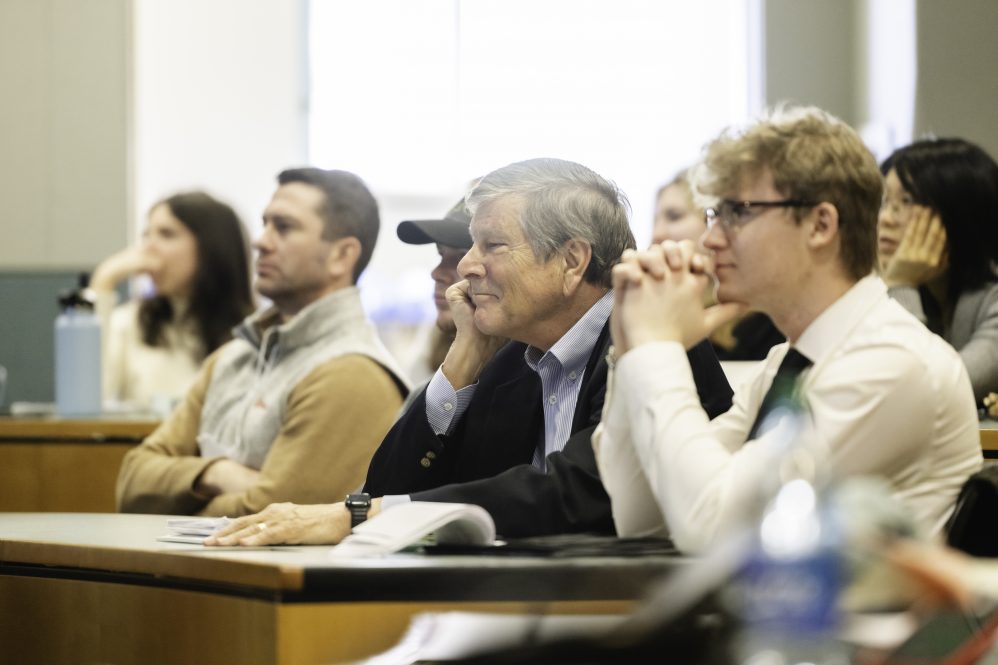After a dozen remarkable years at the helm of the School of Business, Dean John A. Elliott will step aside next month and return to the accounting faculty.
Elliott’s many achievements include creating new academic programs, expanding hands-on learning opportunities, championing the development of entrepreneurship programs serving all students, and expanding business education at regional campuses in Stamford and Hartford.
He spearheaded the rapid and successful pivot from in-person to online education at the beginning of the COVID-19 pandemic, something he described as one of his biggest challenges.
His impact extends well beyond UConn, having mentored three associate deans who went on to lead business schools at the University of New Hampshire, Michigan State, and DePaul during the last three years.
But for many who worked closely with him, it was his calm, warm, and inclusive leadership style that left an indelible impression.
“John is known for his talents in communicating, his careful listening habits, his honesty and integrity, as well as his ability to collaborate with others,’’ says Provost Anne D’Alleva. “He has been an empathetic and highly effective academic leader.’’
D’Alleva named professor Greg Reilly, an advocate for innovative learning and a leading strategic management scholar with experience training executives worldwide, as the interim dean, effective Jan. 3. He has been a faculty member since 2007.
Elliott Brought Stability After Turnover

Elliott joined UConn in 2012, after serving as business dean at Baruch College, part of the City University of New York. He previously taught accounting for 20 years as a faculty member at Cornell University, his Ph.D. alma mater.
Alumnus Keith R. Fox ’81, a former senior executive at Apple and Cisco and an advisor to the last four UConn business deans, says Elliott was a standout.
“John was the perfect business dean at the right time for UConn,’’ he says, noting that Elliott brought stability to the School after a series of turnovers. “We needed someone to take the business school to the next level with cohesion, vision, and direction. John was seasoned and wanted to move the business school forward. He offered a clear mission, vision and purpose. He built a team to do that and added meaningful and impactful programs.’’
During his tenure, Elliott sunset the full-time MBA program and added a popular online MBA degree, expanded specialized business master’s degree programs, including the master’s in business analytics and project management and a master’s in fintech, and developed and expanded entrepreneurship opportunities.
Alumnus Bob Chauvin ’78, former President of Tyco SimplexGrinnell, and an eight-year member of the Dean’s Advisory Board, says he admires Elliott’s leadership abilities.
“One of his true strengths is his humility,’’ Chauvin says. “He is one of the smartest people I know, but also one of the most humble leaders. He is forward-thinking and insightful, but always interested in what others think. He is very articulate, a guy that people want to follow … a true leader. When you are talking with John, you are not talking with ‘the dean’ but a really bright, nice, and interesting guy. He will be missed, and we all wish him the best.’’
A Mentor to Three Future Deans
In recent years, three of Elliott’s associate deans have become business deans at other prestigious universities. David Souder joined Michigan State University as its business dean this summer. In 2022, Lucy Gilson became business dean at University of New Hampshire, and Sulin Ba accepted the top role in the business school at DePaul.
“John was an important mentor for me. He encouraged my work and showed me the finer points of leadership,’’ Souder says. “There is a calmness to John’s approach and wisdom that comes from experience, patience, and a willingness to listen to every side of the story. John is the kind of leader who looks for talented people and empowers them in their work. It was valuable to me to see how he put that into practice.’’
Souder says he watched the graduate business landscape change dramatically in recent years, from primarily MBA programs to also include specialty master’s degrees. He says Elliott’s steady leadership, paired with a willingness to listen to faculty experts, enhanced the business school’s success in that realm.
“Twelve years is a really impressive tenure as a dean,’’ he says. “John really improved the culture at the School tremendously. He helped people to embrace the whole mission—teaching, research, outreach and service—and that will be an important part of his legacy.”
Gilson says that in her leadership role in New Hampshire, she tries to imitate some of Elliott’s style.
“The fact that he was always very thoughtful and sought input from multiple sources before rendering an opinion is something I try to emulate,’’ she says. When the prospect of accepting the dean position weighed on her, she recalls Elliott’s succinct advice: ‘You’re ready to be a dean.’
“As far as professionalism, John walks the talk,’’ she says. “He is incredibly trustworthy, he can keep a confidence, gives great advice, and when he says something he means it. Working for him was a good experience and his legacy will be his academic leadership and administration, and the impact that he’s had on students, faculty, and staff.’’
Entrepreneurship Efforts Were Vast
Fox, an entrepreneur who brought the Innovation Quest (iQ) entrepreneurship program to UConn with the guidance of Elliott and others, says the entire university benefitted from Elliott’s commitment to new business ventures.
Elliott not only welcomed the iQ program but grew the Wolff New Venture Competition and supported the Connecticut Center for Entrepreneurship & Innovation (CCEI), all generating new businesses and promising young entrepreneurs in Connecticut. The success of those programs spurred former pharmaceutical CEO and philanthropist Peter Werth to pledge $22.5 million to UConn for the Werth Institute for Entrepreneurship & Innovation in 2017, Fox says.

The entrepreneurship programs have had an impact on students from across the university and from different majors, including engineering, art, nursing and business, who now can explore creativity, innovation, and business creation, Fox says.
“He’s a team player, a good guy, and a really good person,’’ Fox says. “He did a great deal to move the ranking of the school forward and expand the recognition of UConn’s academic prowess. It is fair to say that School of Business helped UConn’s rankings move forward as well. John was a pleasure to work with and he is leaving a great legacy and framework for the person who comes next.’’
Elliott Served as Interim Provost; Encouraged Minority Students to Become Professors
In addition to leading the School of Business, Elliott also served as UConn’s interim provost from March 2019 until May 2020; participated in the University senate; and chaired search and reappointment committees. He is also the Auran J. Fox Chair in Business.
As the Chair of the Association to Advance Collegiate Schools of Business (AACSB), considered the gold standard business-school accreditation, he led efforts to provide the 800 member business schools worldwide with standards of excellence.
Elliott is also proud of his status as a founding member and chair of The PhD Project Academic Advisory Council, which is a catalyst for historically underrepresented populations to pursue doctoral degrees and go on to become business faculty.
Advanced Business School’s National Reputation
Professor Robin Coulter, head of the Marketing Department, has worked with Elliott for more than a decade.
“His strong integrity and commitment to higher education, to scholarship, and to teaching has significantly advanced the UConn School of Business’ national reputation, as well as our undergraduate and graduate programs,’’ she says. “John has developed strong relationships with business partners, and his collaborative leadership style has led to the School being a respected partner at UConn. I am wishing John well and look forward to continuing to seek his counsel as a fellow faculty member.’’
Professor George Plesko, head of the Accounting Department and a former associate dean, described Elliott’s terms as transformational, both in encouraging and facilitating innovation and research in the School and elevating its national profile.
“John’s academic accomplishments, which included receipt of two of the most prestigious research awards in the field of accounting, has benefited our recruiting of faculty,’’ Plesko says, adding that his national leadership roles also drew additional attention to UConn. “He has been an invaluable partner and leader, and I look forward to our continued collaboration.’’
In a letter to his team Monday, Elliott noted that the School has many initiatives underway and that the future is filled with opportunity. He thanked them for their engagement, leadership, energy, and effort.
Elliott highlighted faculty and staff efforts to accommodate and nurture a growing student body; highlighted the growth and expansion of the Business Connections Learning Community in Storrs and now in Stamford; and mentioned his pride in new and growing programs including the Student Managed Fund, Hillside Ventures, and the Connecticut Information Technology Institute.
“I am immensely grateful for the opportunity to work with you and so very proud of the results you have produced,’’ Elliott says.
“Through it all, you have supported student learning and launched our graduates into promising careers and successful lives,’’ he wrote. “The table is set for an excellent decade to come, and you are poised to create that future. I know you will.’’



